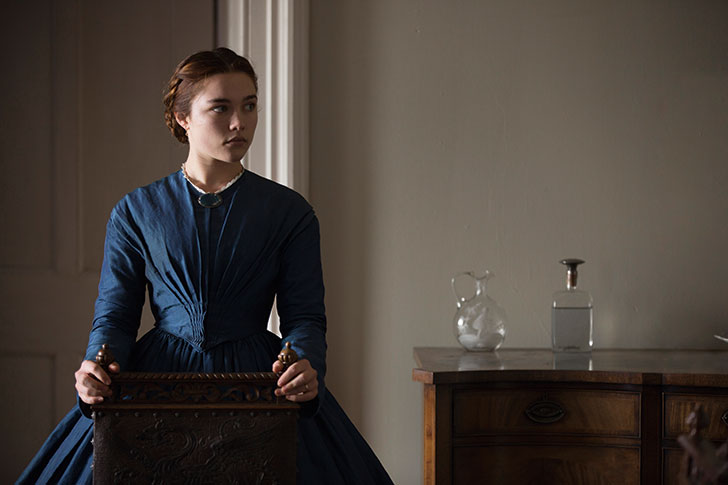Lady Macbeth, which has nothing to do with boring old Shakespeare beyond indicating a certain archetype (huge sighs of relief all round), is a British period drama about a young woman who, trapped in a cold, loveless marriage, finds sexual passion elsewhere, and runs with it. And runs with it. And runs with it. And if you think you’ve seen this all before — Madame Bovary, Anna Karenina, Lady Chatterley, etc. — think again, my friend. In fact, if Madame Bovary were here with us right now, along with Anna and Lady Chatterley and all the other women in literature who’ve been punished for veering off message, my best guess is they’d be fist-pumping the air while crying: ‘You go, girl, you go!’ (Or similar.) This circumvents all our expectations, plays like a thriller, ditches bonnets for more murderous pursuits, and is plain terrific. Bit of a long intro, I can now see. Just remember: ‘Plain terrific.’
Directed by William Oldroyd (formerly director in residence at the Young Vic Theatre) with a script by Alice Birch (a playwright with work performed at the Royal Court and RSC), the film is based on Lady Macbeth of the Mtsensk District, the 1865 novella by Nikolai Leskov first published in Dostoevsky’s magazine, Epoch. (I know this stuff: I didn’t just look it up on Wikipedia.) Here, the action stays in Victorian times but has been transposed from the Mtsensk district, wherever in Russia that is, to Northumberland, I think — the exact region is never specified, but I noted some Geordie in the air — and Katerina has become Katherine. She is played by relative newcomer, Florence Pugh, who is truly remarkable; who must convince us that sweet innocence can warp into a mad, destructive, unrepentant lust, and does it, in spades.
The film opens on Katherine’s wedding day, when she’s being married off to an older man (Paul Hilton) who lives with his father (Christopher Fairbank). She is chattel, having been bought by the father ‘along with a piece of land not fit enough to graze a cow on’. Their house is grand but remote and chilly. Katherine must stay in this house at all times. Katherine is bored to the point of stupefaction. Katherine is obliged to wear constricting corsets. Katherine’s marriage is as sexless as it is loveless. Her husband demands she stands naked, then leaves her in the dark to shiver, or demands she faces the wall while he masturbates. Either way, he’s not exactly winning anybody over here.
But then she falls for Sebastian (Cosmo Jarvis), the groom. He’s her Mellors, if you like. But once her sexual desire is unleashed you will be constantly surprised as to where it takes her. You won’t always approve, but you will be surprised. I don’t wish to land myself in any spoiler trouble, so will only say that Katherine’s maid, Anna (Naomi Ackie), is struck mute by what she sees. Anna is black, by the way, as are a couple of characters introduced later. They just happen to be black, as they might well have been, given many well-to-do houses did have black servants at that time, and it’s just a Ukip-style fantasy to imagine otherwise.
This is a micro-budget film. You know, shot in 24 days for 42p. (Actually, £350,000, but in film terms that is around 42p.) And everything is spare. The music is spare. The script is spare. The locations are spare. Katherine’s frocks are lush but spare, in the sense there are so few of them. Sometimes, all this spareness is a drag. Why are there no horses in the stables? Can you blame Sebastian for shagging the mistress of the house, given that he has nothing to groom? But ultimately it just adds to the sense of what Katherine’s life would have been if she’d not taken matters into her own hands: a spare life devoid of all nourishment or comfort.
The pace is brisk — we’re all done in 89 minutes — and the direction is sure-footed and never heavy-handed. There is violence, but most of the abuse is slyly psychological, and allowed to just sit with us. The ending has, it’s true, been substantially changed from that of the novella (I know this stuff: I didn’t just skim read the novella on my Kindle just now) but as I prefer this ending, I won’t complain.
This is a film that says women who try to break free don’t have to fade away or top themselves. (‘Yay!’ says Thérèse Raquin). Yet the only thing you need to truly remember? Plain terrific.
Got something to add? Join the discussion and comment below.
Get 10 issues for just $10
Subscribe to The Spectator Australia today for the next 10 magazine issues, plus full online access, for just $10.
You might disagree with half of it, but you’ll enjoy reading all of it. Try your first month for free, then just $2 a week for the remainder of your first year.














Comments
Don't miss out
Join the conversation with other Spectator Australia readers. Subscribe to leave a comment.
SUBSCRIBEAlready a subscriber? Log in